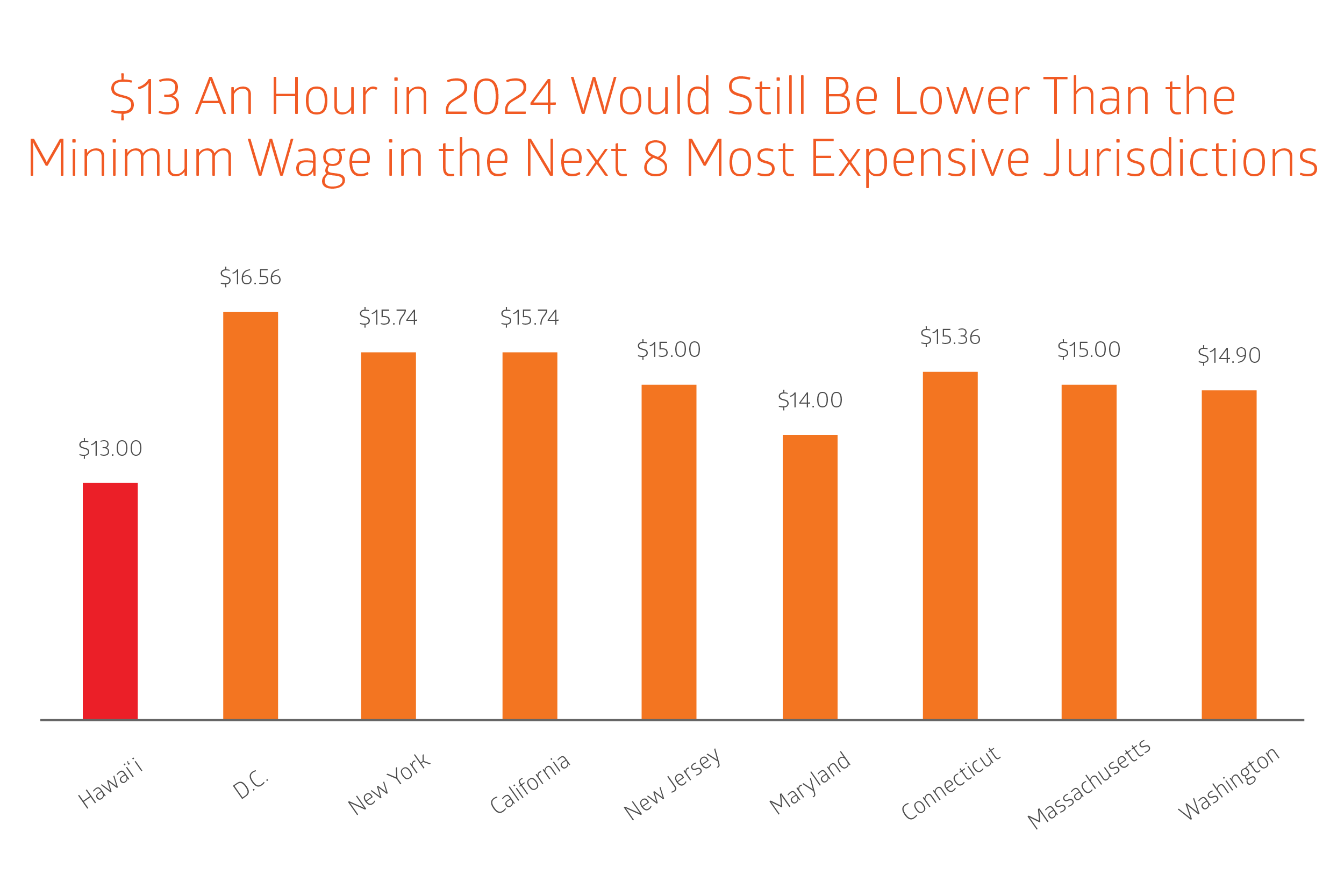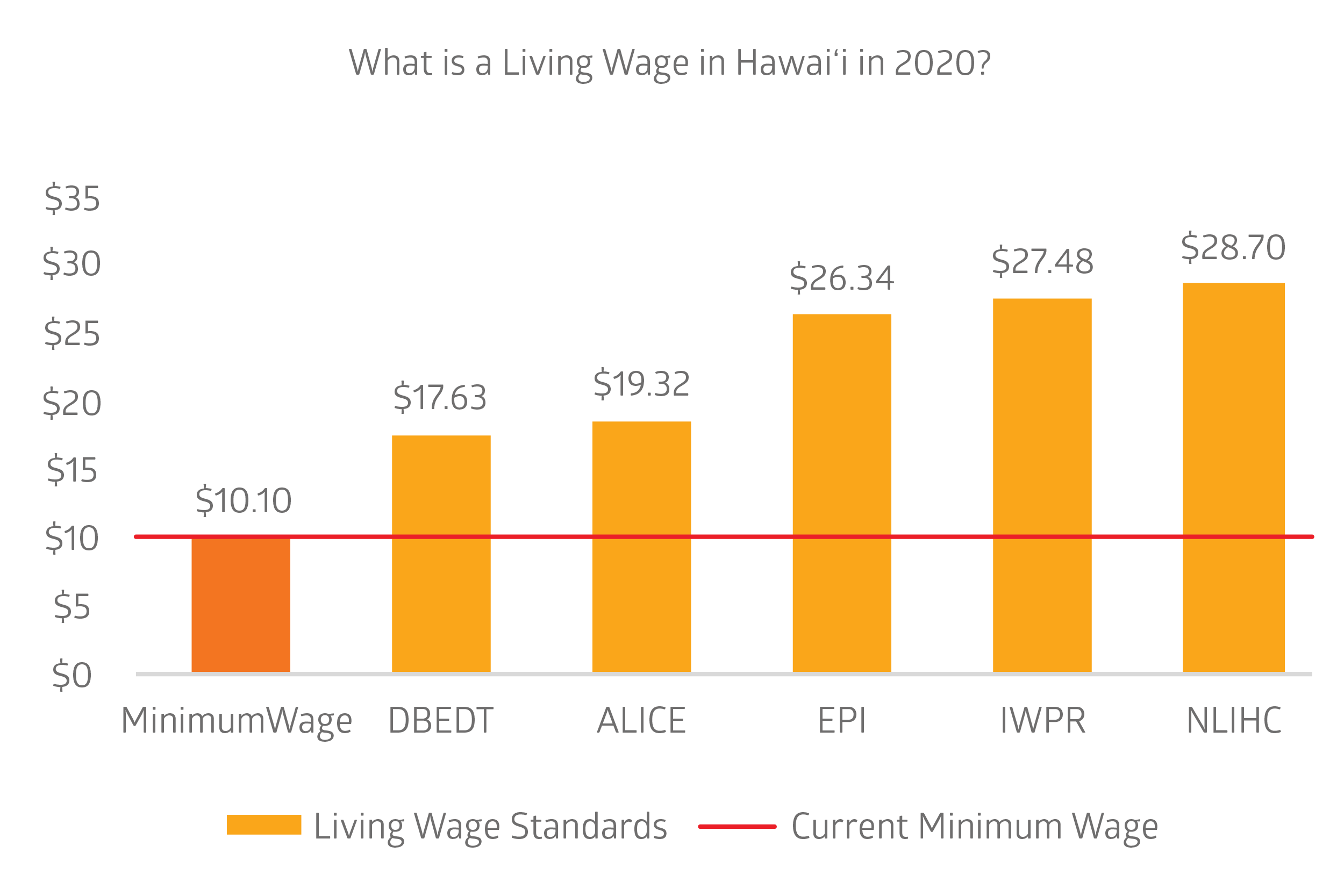$13 an hour isn't enough to live on in 2020, much less 2024
$13 an hour is about $27,000 a year for full-time work. That’s not enough to live on in 2020, let alone 4 years from now. In the most expensive state in the nation, Hawaiʻi’s minimum wage workers need to make enough to be able to afford the basics.
The last time Hawaiʻi’s minimum wage earners got a raise—to $10.10 an hour—was January 1, 2018. They already have been stuck at that level—$21,000 a year for full-time work—for more than 2 years. With inflation eroding their pay, $10.10 now is worth only $9.68, so full-time minimum wage workers in Hawaiʻi are losing the equivalent of over $500 per year to inflation.
Hawaiʻi’s current minimum wage is already lower than in all other highest cost-of-living states. And Hawaiʻi will be falling further behind. The next eight most expensive states have passed laws to raise their minimum wages to at least $15 over the next 5 years—and the cost of living in all of those states is lower than in Hawaiʻi.
These other high cost-of-living states also already have refundable state earned income tax credits (EITC), meaning that a tax payer can get a refund if their credit is worth more than they owe in income tax, for low-wage and working-class taxpayers.
In addition, EITC-eligible taxpayers in those other states receive a higher percentage of their federal EITC from their states (except in Washington, which doesn’t have an income tax) than in Hawaiʻi. In other words, even if Hawaiʻi’s EITC becomes refundable, minimum wage earners in the next eight most expensive states will receive more from their EITCs than in Hawaiʻi.
With those eight other states—all with lower costs of living than in Hawaiʻi—already on track to raise their minimum wage well past $15 in the coming years, Hawaiʻi should raise its wage by between $1 and $1.50 per year to $17 an hour by 2025. That would mean an average increase of 11 percent per year—which is less than some of the increases in Hawaiʻi’s minimum wage in the late 1960s, late 1980s, early 1990s and earlier this century.
How much do people need to make ends meet in Hawaiʻi? Our state Department of Business, Economic Development & Tourism (DBEDT) estimates that a single person with no children in Hawai‘i needs to earn $17.63 an hour to “meet their basic needs” in 2020. Other research groups have pegged basic economic security in Hawaiʻi even higher.
In addition to DBEDT, Aloha United Way commissioned the “A.L.I.C.E. Report” in 2015, which found that a household of four needs two earners to make $19.32 each to survive. The Economic Policy Institute calculates Hawaiʻi’s self-sufficiency standard for a single worker with no children at $26.34, while the Institute for Women’s Policy Research puts that number at $27.48. Meanwhile, the the National Low-Income Housing Coalition calculates that, to afford a one-bedroom market-rate apartment, a worker needs to make $28.70 in 2020.
The difference between $17 an hour and $13 an hour is more than $8,000 per year for full-time work. That’s much more than the vast majority of low-wage and working-class taxpayers in Hawaiʻi will receive in tax credits.
In the most expensive state to live in the nation, our struggling low-wage families need bigger tax credits and a robust boost to the minimum wage. Otherwise working-age people in Hawaiʻi will keep moving away to other states, where they’ll be paid more and be able to afford a decent standard of living.









